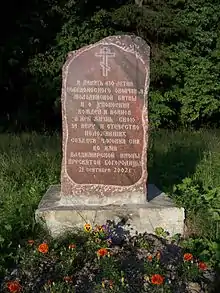Battle of Molodi
The Battle of Molodi (Russian: Битва при Молодях) was one of the key battles of Ivan the Terrible's reign. It was fought near the village of Molodi, 40 miles (64 km) south of Moscow, in July–August 1572 between the 40,000–60,000-strong[3] horde of Devlet I Giray of Crimea and about 23,000–25,000 Russians led by Prince Mikhail Vorotynsky. The Crimeans had burned Moscow the previous year, but this time they were thoroughly defeated.
| Battle of Molodi | |||||||
|---|---|---|---|---|---|---|---|
| Part of the Russo–Crimean Wars | |||||||
 Molody village. A foundation stone to commemorate the victory in the Battle of Molodi in 1572. | |||||||
| |||||||
| Belligerents | |||||||
|
|
| ||||||
| Commanders and leaders | |||||||
|
|
| ||||||
| Strength | |||||||
|
|
| ||||||
| Casualties and losses | |||||||
|
|
| ||||||
While the Tsardom of Russia was involved in the Livonian War, the Crimean khan hoped to make profit from the weakness of its southern borders. In the course of three expeditions, Devlet I Giray devastated South Russia and even sacked and set Moscow to fire (see Fire of Moscow (1571)). On 26 July 1572 the huge horde of the khan, equipped with cannons and reinforced by Turkish janissaries, crossed the Oka River near Serpukhov, decimated the Russian vanguard of 200 men, and advanced towards Moscow in order to pillage it once again.[2] Little did they know, however, that the Russians had prepared for the new invasion, setting up innovative fortifications just beyond the Oka.
The Russian forces, variously estimated at between 23,000–25,000 men, were placed under the supreme command of Prince Mikhail Vorotynsky. Prince Repnin led the left flank, while the right flank was commanded by Prince Odoevsky. On 30 July the armies clashed near the Lopasnya River without so much as a prior reconnaissance. The fighting continued for several days, reaching its peak on 8 August. The large amount of close-in fighting made the Tatars' famed skill in archery quite useless:[2] the battle was fought principally with sabers and spears. Artillery was also used by the Russians to great effect. The outcome was decided by Prince Khvorostinin who bypassed the horde with his gulyay-gorod (гуляй-город) mobile fortifications and infiltrated into the rear.
After the battle, only 20,000 Tatar horsemen returned to the Crimea, while the khan left his tent and banner on the battlefield and barely managed to escape alive. The battle claimed the lives of his sons and a grandson.
Sources
- Robert Payne and Nikita Romanoff, Ivan the Terrible, (Cooper Square Press, 2002), 329.
- A Global Chronology of Conflict: From the Ancient World to the Modern Middle East, Vol.II, ed. Spencer C. Tucker, (ABC-CLIO, 2010), 531.
- Новгородская вторая летопись. Год 7080(1572).ПСРЛ т. III, СПб, 1841
External links
- (in Russian) http://www.hrono.ru/sobyt/1500sob/molod.html
- (in Russian) http://www.kulichki.com/moshkow/HISTORY/ANDREEW_A_R/krym_history.txt#45
- (in Russian) http://www.magister.msk.ru/library/history/karamzin/kar09_03.htm
- (in Russian) http://www.vostlit.info/Texts/Dokumenty/Russ/XVI/1560-1580/Schlacht_Molodi/text.htm
- (in English) http://www.xenophon-mil.org/rushistory/battles/ivanbook.htm